
Going My Way is a 1944 American musical comedy drama film directed by Leo McCarey and starring Bing Crosby and Barry Fitzgerald. Written by Frank Butler and Frank Cavett, based on a story by McCarey, the film is about a new young priest taking over a parish from an established old veteran. Crosby sings five songs with other songs performed onscreen by Metropolitan Opera's star mezzo-soprano Risë Stevens and the Robert Mitchell Boys Choir. Going My Way was the highest-grossing picture of 1944, and was nominated for ten Academy Awards, winning seven, including Best Picture. Its success helped to make movie exhibitors choose Crosby as the biggest box-office draw of the year, a record he would hold for the remainder of the 1940s. After World War II, Crosby and McCarey presented a copy of the film to Pope Pius XII at the Vatican. Going My Way was followed the next year by a sequel, The Bells of St. Mary's.
James Vincent Monaco was an Italian-born American composer of popular music.

John Francis Burke was an American lyricist, successful and prolific between the 1920s and 1950s. His work is considered part of the Great American Songbook.

Joseph Matthews "Wingy" Manone was an American jazz trumpeter, composer, singer, and bandleader. His recordings included "Tar Paper Stomp", "Nickel in the Slot", "Downright Disgusted Blues", "There'll Come a Time ", and "Tailgate Ramble".
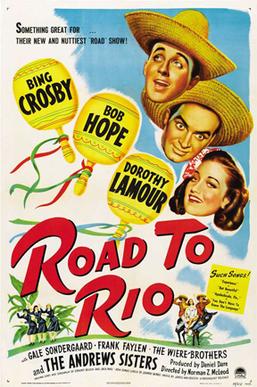
Road to Rio is a 1947 American semimusical comedy film directed by Norman Z. McLeod and starring Bing Crosby, Bob Hope, and Dorothy Lamour. Written by Edmund Beloin and Jack Rose, the film is about two inept vaudevillians who stow away on a Brazilian-bound ocean liner and foil a plot by a sinister hypnotist to marry off her niece to a greedy fortune hunter. Road to Rio was the fifth of the "Road to …" series.

"Vaya con Dios (May God Be With You)" (, literally "Go with God") is a popular song written by Larry Russell, Inez James, and Buddy Pepper, and first recorded by Anita O'Day in December 1952. Les Paul and Mary Ford had a No. 1 recording of the song in 1953. Members of the Western Writers of America chose it as one of the Top 100 Western songs of all time.
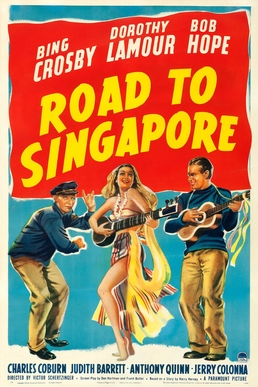
Road to Singapore is a 1940 American semi-musical comedy film directed by Victor Schertzinger and starring Bing Crosby, Dorothy Lamour and Bob Hope. Based on a story by Harry Hervey, the film is about two playboys trying to forget previous romances in British Singapore, where they meet a beautiful woman. Distributed by Paramount Pictures, the film marked the debut of the long-running and popular "Road to ..." series of pictures spotlighting the trio, seven in all. The supporting cast features Charles Coburn, Anthony Quinn, and Jerry Colonna.

Bing: A Musical Autobiography was Bing Crosby's fourth Decca vinyl LP, recorded and released in 1954.

Variety Girl is a 1947 American musical comedy film directed by George Marshall and starring Mary Hatcher, Olga San Juan, DeForest Kelley, Frank Ferguson, Glenn Tryon, Nella Walker, Torben Meyer, Jack Norton, and William Demarest. It was produced by Paramount Pictures. Numerous Paramount contract players and directors make cameos or perform songs, with particularly large amounts of screen time featuring Bing Crosby and Bob Hope. Among many others, the studio contract players include Gary Cooper, Alan Ladd, Paulette Goddard, Ray Milland, William Holden, Burt Lancaster, Robert Preston, Veronica Lake, William Bendix, Barbara Stanwyck and Paula Raymond.
"Only Forever" is a song popularized in 1940 by Bing Crosby. It reached number one on the Billboard charts on October 19, 1940 and spent nine weeks in that position during a 20-week stay in the charts. "Only Forever" was written by James V. Monaco and Johnny Burke, initially intended for the 1940 Crosby film If I Had My Way, but it was eventually used in Crosby's next film project, Rhythm on the River and the song was nominated for the Academy Award for Best Original Song.
Joseph Hilton "Nappy" Lamare was an American jazz banjoist, guitarist, and vocalist.
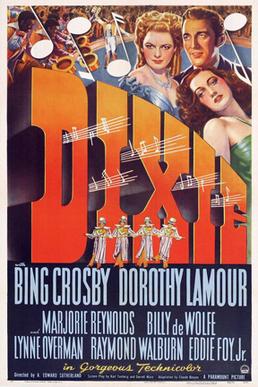
Dixie is a 1943 American biographical film of songwriter Daniel Decatur Emmett directed by A. Edward Sutherland and starring Bing Crosby and Dorothy Lamour. Filming in Technicolor, Dixie was only a moderate success and received mixed reviews. Contrary to rumor, it has not been withdrawn from circulation due to racial issues but is simply one of hundreds of vintage Paramount Pictures from the 1930s and 1940s now owned by Universal and not actively marketed; it was broadcast several times in the late 1980s on the American Movie Classics channel. The film produced one of Crosby's most popular songs, "Sunday, Monday, or Always".

Star Spangled Rhythm is a 1942 American all-star cast musical film made by Paramount Pictures during World War II as a morale booster. Many of the Hollywood studios produced such films during the war, generally musicals, frequently with flimsy storylines, and with the specific intent of entertaining the troops overseas and civilians back home and to encourage fundraising – as well as to show the studios' patriotism. This film was also the first released by Paramount to be shown for 8 weeks.
Riding High is a 1950 black-and-white musical racetrack film featuring Bing Crosby and directed by Frank Capra. The songs were performed live during filming instead of the customary lip-synching to studio recordings. The film is a remake of an earlier Capra film with screenwriter Robert Riskin titled Broadway Bill (1934). While the film is generally a light musical comedy, its plot contains an unexpected tragic turn.

If I Had My Way is a 1940 musical comedy film directed by David Butler and starring Bing Crosby and Gloria Jean. Based on a story by David Butler, the film is about a construction worker who takes charge of the daughter of a friend killed in an accident.
Rhythm on the Range is a 1936 American Western musical film directed by Norman Taurog and starring Bing Crosby, Frances Farmer, and Bob Burns. Based on a story by Mervin J. Houser, the film is about a cowboy who meets a beautiful young woman while returning from a rodeo in the east, and invites her to stay at his California ranch to experience his simple, honest way of life. Rhythm on the Range was Crosby's only Western film and introduced two western songs, "Empty Saddles" by Billy Hill and "I'm an Old Cowhand " by Johnny Mercer, the latter becoming a national hit song for Crosby. The film played a role in familiarizing its audience with the singing cowboy and Western music on a national level.
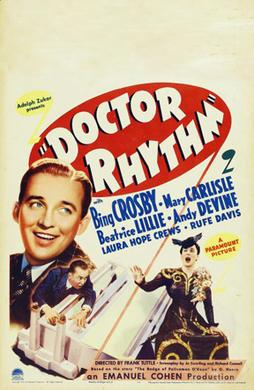
Doctor Rhythm is a 1938 American musical comedy film directed by Frank Tuttle and starring Bing Crosby, Mary Carlisle, Beatrice Lillie, and Andy Devine. Based on the 1907 short story The Badge of Policeman O'Roon by O. Henry, the film is about a doctor who pretends to be a policeman assigned as the bodyguard of a wealthy matron, whose beautiful niece becomes the object of his affections. The film features the songs "On the Sentimental Side" and "My Heart Is Taking Lessons".
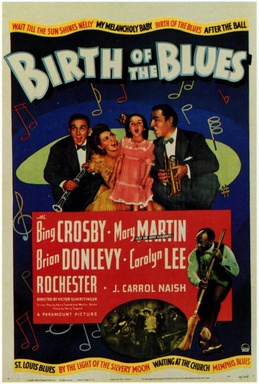
Birth of the Blues is a 1941 American musical film directed by Victor Schertzinger and starring Bing Crosby, Mary Martin and Brian Donlevy.
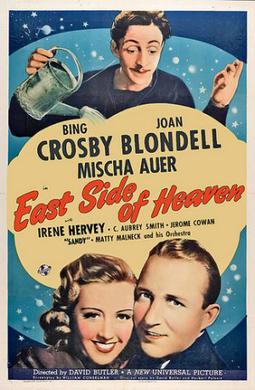
East Side of Heaven is a 1939 American musical film directed by David Butler and written by William M. Conselman and James V. Kern. The film stars Bing Crosby, Joan Blondell, Mischa Auer, Irene Hervey, C. Aubrey Smith, Robert Kent and Jerome Cowan. Filming took place in Hollywood from January 13 to March 7, 1939. The film was released on April 7, 1939, by Universal Pictures and had its New York premiere at Radio City Music Hall on May 4, 1939. This was another independent production in which Crosby had a financial interest.
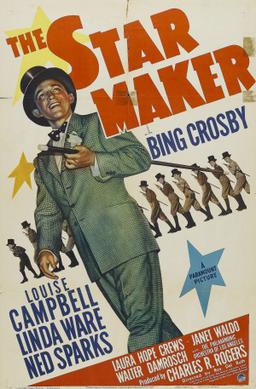
The Star Maker is a 1939 American musical film directed by Roy Del Ruth, written by Frank Butler, Don Hartman and Arthur Caesar, and starring Bing Crosby, Louise Campbell, Linda Ware, Ned Sparks, Laura Hope Crews, Janet Waldo and Walter Damrosch. Filming started in Hollywood on April 17, 1939 and was finished in June. The film was released on August 25, 1939, by Paramount Pictures, and had its New York premiere on August 30, 1939. It was the only film in which Crosby played a happily married man.















